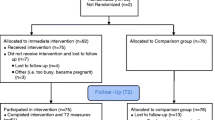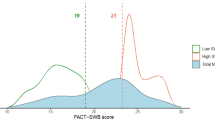Abstract
Background: The efficacy of a group-based psychosocial intervention with ethnic minority health populations may depend on consideration for cultural factors that can interact with group processes. Purpose: The current study explored the efficacy of a 10-week group-based cognitive-behavioral stress management (CBSM) intervention that was linguistically and culturally adapted for use with Hispanic monolingual men recently treated for localized prostate carcinoma (PC). Methods: 71 Hispanic monolingual Spanish speakers were randomly assigned to a 10-week CBSM intervention or a half-day stress management seminar (control condition). Hierarchical regression was used to predict post-intervention QoL. Results: After controlling for relevant covariates, assignment to the CBSM condition significantly predicted greater physical well-being, emotional well-being, sexual functioning, and total well-being after the 10-week intervention period. Conclusions: Results suggest that participation in a culturally and linguistically adapted CBSM group intervention improved QoL in Hispanic monolingual men treated for localized PC.
Similar content being viewed by others
References
American Cancer Society. (2004).Cancer facts and figures-2004. Atlanta, GA: American Cancer Society.
Antoni, M. H. (2003). Stress management effects on psychological, endocrinological, and immune functioning in men with HIV infection: Empirical support for a psychoneuroimmunological model.Stress, 6, 173–188.
Antoni, M. H., Baggett, L., Ironson, G., August, S., La Perriere, A., & Klimas, N. et al. (1991). Cognitive-behavioral stress management intervention buffers distress responses and immunologic changes following notification of HIV-1 seropositivity.Journal of Consulting and Clinical Psychology, 59, 906–915.
Arcaya, J. M. (1996). The Hispanic male in group psychotherapy. In M. P. Andronico (Ed.),Men in Groups: Insights, Interventions, and Psychoeducational Work (pp. 151–161). Washington, DC: American Psychological Association.
Castro, F. G., Coe, K., Gutierres, S., & Saenz, D. (1996). Designing health promotion programs for Latinos. In P. Kato, & T. Mann (Eds.),Handbook of Diversity Issues in Health Psychology. The Plenum Series in Culture and Health (pp. 319–345). New York: Plenum Press.
Cella, D., Hernandez, L., Bonomi, A. E., Corona, M., Vaquero, M., & Shiomoto, G. et al. (1998). Spanish language translation and initial validation of the functional assessment of cancer therapy quality of life instrument.Medical Care, 36, 1407–1418.
Charlson, M. E., Pompei, P., Ales, K. L., & MacKenzie, C. R. (1987). Anew method of classifying prognostic comorbidity in longitudinal studies: Development and validation.Journal of Chronic Disease, 40, 373–383.
Eton, D. T., & Lepore, S. J. (2002). Prostate cancer and health-related quality of life: A review of the literature.Psycho-Oncology, 11, 307–326.
First, M. B., Spitzer, R. L., Gibbon, M., & Williams, J. B.W. (2002).Structured clinical interview for DSM-IV-TR Axis I disorders, research version, non-patient edition (SCID-I/NP). New York: Biometrics Research, New York State Psychiatric Institute.
Folstein, M. F., Folstein, S. E., & McHugh, P. R. (1975). “Minimental state”. Apractical method for grading the cognitive state of patients for the clinician.Journal of Psychiatric Research, 12, 189–198.
Hoffman, R. M., Hunt, W. C., Gilliland, F. D., Stephenson, R. A., & Potosky, A. L. (2003). Patient satisfaction with treatment decisions for clinically localized prostate carcinoma. Results from the prostate cancer outcomes study.Cancer, 97, 1653–1662.
Jimenez, R. G., & de Figuereido, J. M. (1994). Issues in the psychiatric care of Hispanic American elders. In K. M. Sakauye et al. (Eds.),Ethnic minority elderly: A task force report of the American Psychiatric Association. Washington, DC: American Psychiatric Association.
Lepore, S. J. (2001). A social-cognitive processing model of emotional adjustment to cancer. In A. Baum & B. L. Andersen (Eds.),Psychosocial Interventions in Cancer (pp. 99–116). Washington, DC: American Psychological Association.
Litwin, M. S., McGuigan, K. A., Shpall, A. I., & Dhanani, N. (1999). Recovery of health related quality of life in the year after radical prostatectomy: Early experience.Journal of Urology, 161, 515–519.
Litwin, M. S., Melmed, G. Y., & Nakazon, T. (2001). Life after radical prostatectomy: Alongitudinal study.Journal of Urology, 166, 587–592.
Marin, G., & Marin, B. V. (1991).Research with Hispanic populations. Thousand Oaks, CA: Sage.
Meyerowitz, B. E., Richardson, J., Hudson, S., & Leedham, B. (1998). Ethnicity and cancer outcomes: Behavioral and psychosocial considerations.Psychological Bulletin, 123, 47–70.
Mishel, M. H., Belyea, M., Germino, B. B., Stewart, J. L., Bailey Jr., D. E., & Robertson, C. et al. (2002). Helping patients with localized prostate carcinoma manage uncertainty and treatment side effects.Cancer, 94, 1854–1866.
Mishra, S. I., Chavez, L. R., Magana, J. R., Nava, P., Valdez, R. B., & Hubbell, F. A. (1998). Improving breast cancer control among Latinas: Evaluation of a theory-based educational program.Health Education and Behavior, 25, 653–670.
Navarro, A. M., Senn, K. L., McNicholas, L. J., Kaplan, R. M., Roppe, B., & Campo, M. C. (1998). Por la vida model intervention enhances use of cancer screening tests among Latinos.American Journal of Preventive Medicine, 15, 32–41.
Penedo, F. J., Antoni, M. H., Dahn, J., Molton, I., Gonzalez, J. S., & Kinsinger, D. et al. (2000).Cognitive-behavioral stress management in men treated for prostate cancer. Unpublished intervention manual.
Penedo, F. J., Dahn, J. R., Molton, I., Gonzalez, J. S., Kinsinger, D., & Roos, B. A. et al. (2004). Cognitive-behavioral stress management improves stress-management skills and quality of life in men recovering from treatment of prostate carcinoma.Cancer, 100, 192–200.
Penson, D. F., Feng, Z., Kuniyuki, A., McClerran, D., Albertsen, P. C., & Deapen, D. et al. (2003). General quality of life 2 years following treatment for prostate cancer: What influences outcomes? Results from the prostate cancer outcomes study.Journal of Clinical Oncology, 21, 1147–1154.
Rehse, B., & Pukrop, R. (2002).Effects of psychosocial interventions on quality of life in adult cancer patients: Meta analysis of 37 published control outcome studies.PatientEducation and Counseling, 1658, 1–8.
Rovasco, P., Monteiro-Grillo, I., & Camilo, M. E. (2003). Does nutrition influence quality of life in cancer patients undergoing radiotherapy?Radiotherapy Oncology, 67, 213–220.
Schover, L. R., Fouladi, R. T., Warneke, C. L., Nesse, L., Klein, E. A., & Zippe, C. (2002). Defining sexual outcomes after treatment for localized prostate carcinoma.Cancer,95, 1773–1785.
Sheard, T., & Maguire, P. (1999). The effect of psychological interventions on anxiety and depression in cancer patients: Results of two meta-analyses.British Journal of Cancer, 80, 1770- 1780.
U.S. Bureau of the Census.(2002).Census 2000 profile. U.S. Bureau of the Census.
Wei, J. T., Dunn, R. L., Litwin, M. S., Sandler, H., & Sanda, M. G. (2000). Development and validation of the expanded prostate cancer index composite (EPIC) for comprehensive assessment of health-related quality of life in men with prostate cancer.Urology, 56, 899–905.
Wei, J. T., Dunn, R. L., Sandler, H. M., McLaughlin, P. W., Montie, J. E., & Litwin, M. S. et al. (2002). Comprehensive comparison of health-related quality of life after contemporary therapies for localized prostate cancer.Journal of Clinical Oncology, 20, 557–566.
Yancey, A. K., Tanjasiri, S. P., Klein, M., & Tunder, J. (1995). Increased cancer screening behavior in women of color by culturally sensitive video exposure.Preventive Medicine, 24, 142–148.
Author information
Authors and Affiliations
Corresponding author
Additional information
This study was supported by National Cancer Institute grants 1P50CA84944 and U01CA86117.
Rights and permissions
About this article
Cite this article
Penedo, F.J., Traeger, L., Dahn, J. et al. Cognitive behavioral stress management intervention improves quality of life in spanish monolingual hispanic men treated for localized prostate cancer: Results of a randomized controlled trial. Int. J. Behav. Med. 14, 164–172 (2007). https://doi.org/10.1007/BF03000188
Issue Date:
DOI: https://doi.org/10.1007/BF03000188




